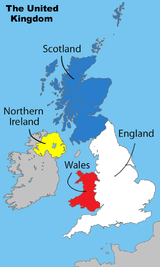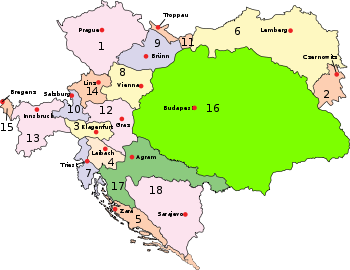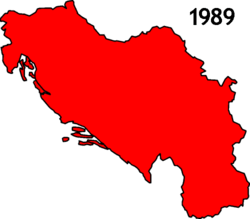- Multinational state
-
A multinational state is a sovereign state which is viewed as comprising two or more nations. Such a state contrasts with a nation-state where a single nation comprises the bulk of the population. The United Kingdom, the Russian Federation and Canada are viewed as present-day examples of multinational states, while Austria-Hungary, the USSR and Yugoslavia are examples of historical multinational states which have since split into a number of sovereign states.
A multinational state need not also be multicultural.
Generally, in the early modern era, multinational states proved to be less successful than nation-states.
Many attempts have been made to define what a multinational state is. One complicating factor is that it is possible for many of the people of what can be considered a 'nation' to consider they have two different nationalities simultaneously. As Ilan Peleg has noted,
Contents
Current multinational states
Russia
The present-day federal state of Russia has over a hundred and sixty different ethnic groups and indigenous peoples. The largest population is the ethnic Russians, who are Slavs with Orthodox traditions, while the Tatars and Bashkirs have a Muslim culture. Russia also has Buddhist populations, such as the nomadic Buryats and Kalmyks, and the Shamanistic peoples of Siberia and the Extreme North, as well as the Finno-Ugric peoples of the Russian North West and the Volga Region and the peoples of the Northern Caucasus, all contributing to the extreme cultural and national diversity of the country.[2]
Out of a total of more than a hundred languages which are spoken in the Russian Federation, the country has twenty-seven official languages. More than 3% of the whole population of the Federation speak Tatar.[3]
In parts of the Federal state conflicts of nationality and other factors have led to secessionism, most notably in Chechnya, where the Chechen Republic of Ichkeria and the Caucasus Emirate have sought independence from Russia.[4]
United Kingdom
 Map showing the four countries of the United Kingdom.
Map showing the four countries of the United Kingdom.
While the Office for National Statistics and others describe the United Kingdom as a 'nation state',[5][6] others, including a then Prime Minister, describe it as a 'multinational state',[7][8][9] and the term Home Nations is used to describe the four national teams that represent the four nations of the United Kingdom (England, Northern Ireland, Scotland, Wales).[10]
The Kingdom of Great Britain was created by the political union of the Kingdom of England and the Kingdom of Scotland on 1 May, 1707.[11] This event was the result of the Treaty of Union that was agreed on 22 July 1706, and then ratified by both the Parliament of England and Parliament of Scotland each passing an Act of Union in 1707.[12] The kingdoms of England and Scotland, together with the kingdom of Ireland, had already been in a personal union as a result of the Union of the Crowns in 1603, when James VI, King of Scots inherited the Kingdoms of England and Ireland and moved his court from Edinburgh to London. However, until 1707, all three remained separate political entities and retained their separate political institutions.[13][14] At the outset of this state, many of its inhabitants retained the sensation of having English, Scottish, Welsh, or indeed Cornish nationality. It is also notable that languages other than English were spoken, principally Scottish Gaelic, Scots, Welsh, Cornish, and Norn.
Almost a century later the Kingdom of Ireland merged with the Kingdom of Great Britain to form the United Kingdom of Great Britain and Ireland with the passing of the Act of Union 1800.[15] In this way, the United Kingdom became the union of the kingdoms of England, Ireland and Scotland.[13][14] Disputes within Ireland over the terms of Irish Home Rule led eventually to the partition of the island in 1921,[16] with Dominion status for the Irish Free State in 1922 while Northern Ireland remained part of the UK.[17] As a result, in 1927, the formal title of the UK was changed to its current form, the United Kingdom of Great Britain and Northern Ireland.[18]
The end of the 20th century saw major changes to the governance of the UK with the establishment of devolved national administrations for Northern Ireland, Scotland, and Wales following pre-legislative referendums.[19]
The Scottish National Party, a major political force in Scotland, is committed to the goal of an independent Scotland within the European Union, but this is opposed by the other parties in Scotland. Plaid Cymru has a similar ambition for Wales.[20]
Former multinational states
Austria-Hungary
Austria-Hungary 
1. Bohemia, 2. Bukovina, 3. Carinthia, 4. Carniola, 5. Dalmatia, 6. Galicia, 7. Küstenland, 8. Lower Austria, 9. Moravia, 10. Salzburg, 11. Silesia, 12. Styria, 13. Tirol, 14. Upper Austria, 15. Vorarlberg; 16. Hungary 17. Croatia-Slavonia; 18. BosniaAustria-Hungary, which succeeded the Austrian Empire, is a historical instance of a multinational state. The centrifugal forces within it, together with the loss of the First World War, led to its breaking up in 1918, when its successor states included the First Austrian Republic, the Kingdom of Hungary, Czechoslovakia, and the State of Slovenes, Croats and Serbs which became part of the Kingdom of Yugoslavia. Parts of Austria-Hungary were also incorporated into Poland, Ukraine, the Kingdom of Romania and the Kingdom of Italy.
The Empire's principal languages were German, Hungarian, Polish Czech and Croatian, but there were many more besides, including Ukrainian, Romanian, Slovak, Serbian, Slovene, Rusyn, Italian, and Yiddish.[21]
USSR
The Union of Soviet Socialist Republics was a union of Soviet republics (of which there were 15 after 1956) with the capital in Moscow. It was founded in December 1922 when the Russian SFSR, which formed during the Russian Revolution of 1917 and emerged victorious in the ensuing Russian Civil War, unified with the Transcaucasian, Ukrainian and Belorussian SSRs. Addressing the Extraordinary Eighth Congress of Soviets of the U.S.S.R. on 25th November, 1936, Stalin stated that "within the Soviet Union there are about sixty nations, national groups and nationalities. The Soviet state is a multi-national state."[22]
In the late 1980s, some constituent republics of the Soviet Union started legal moves towards or even declaration of sovereignty over their territories, citing Article 72 of the USSR Constitution, which stated that any constituent republic was free to secede.[23] On 7 April 1990, a law was passed allowing a republic to secede if more than two-thirds of that republic's residents vote for secession on a referendum.[24] Many held their first free elections in the Soviet era for their own national legislatures in 1990. Many of these legislatures proceeded to produce legislation contradicting the Union laws in what was known as the "War of Laws".
In 1989, the Russian SFSR, which was then the largest constituent republic (with about half of the population) convened a newly elected Congress of People's Deputies. Boris Yeltsin was elected the chairman of the Congress. On 12 June 1990, the Congress declared Russia's sovereignty over its territory and proceeded to pass laws that attempted to supersede some of the USSR's laws. The period of legal uncertainty continued throughout 1991 as constituent republics slowly became de facto independent.
A referendum for the preservation of the USSR was held on 17 March 1991, with the majority of the population voting for preservation of the Union in nine out of 15 republics. The referendum gave Gorbachev a minor boost, and, in the summer of 1991, the New Union Treaty was designed and agreed upon by eight republics which would have turned the Soviet Union into a much looser federation. The signing of the treaty, however, was interrupted by the August Coup—an attempted coup d'état against Gorbachev by hardline Communist Party members of the government and the KGB, who sought to reverse Gorbachev's reforms and reassert the central government's control over the republics. After the coup collapsed, Yeltsin—who had publicly opposed it—came out as a hero while Gorbachev's power was effectively ended. The balance of power tipped significantly towards the republics. In August 1991, Latvia and Estonia immediately declared restoration of full independence (following Lithuania's 1990 example), while the other twelve republics continued discussing new, increasingly looser, models of the Union.
On 8 December 1991, the presidents of Russia, Ukraine and Belarus signed the Belavezha Accords which declared the Soviet Union dissolved and established the Commonwealth of Independent States (CIS) in its place. While doubts remained over the authority of the Belavezha Accords to dissolve the Union, on 21 December 1991, the representatives of all Soviet republics except Georgia, including those republics that had signed the Belavezha Accords, signed the Alma-Ata Protocol, which confirmed the dismemberment and consequential extinction of the USSR and restated the establishment of the CIS. The summit of Alma-Ata also agreed on several other practical measures consequential to the extinction of the Union. On 25 December 1991, Gorbachev yielded to the inevitable and resigned as the president of the USSR, declaring the office extinct. He turned the powers that until then were vested in the presidency over to Boris Yeltsin, president of Russia.
The following day, the Supreme Soviet, the highest governmental body of the Soviet Union, recognized the bankruptcy and collapse of the Soviet Union and dissolved itself. This is generally recognized as the official, final dissolution of the Soviet Union as a functioning state. Many organizations such as the Soviet Army and police forces continued to remain in place in the early months of 1992 but were slowly phased out and either withdrawn from or were absorbed by the newly independent states.
Yugoslavia
The first country to be known by this name was the Kingdom of Yugoslavia, which before 3 October 1929 was known as the Kingdom of Serbs, Croats and Slovenes. It was established on 1 December 1918 by the union of the State of Slovenes, Croats and Serbs and the Kingdom of Serbia (to which the Kingdom of Montenegro was annexed on 13 November 1918, and the Conference of Ambassadors in Paris gave international recognition to the union on 13 July 1922).[25] The Kingdom of Yugoslavia was invaded by the Axis powers in 1941, and because of the events that followed, was officially abolished in 1943 and 1945.
The second country with this name was the Democratic Federal Yugoslavia, proclaimed in 1943 by the Yugoslav Partisans resistance movement during World War II. It was renamed to the Federal People's Republic of Yugoslavia in 1946, when a communist government was established. In 1963, it was renamed again to the Socialist Federal Republic of Yugoslavia (SFRY). This was the largest Yugoslav state, as Istria and Rijeka were added to the new Yugoslavia after the end of World War II.
The constituent six Socialist Republics and two Socialist Autonomous Provinces that made up the country were: SR Bosnia and Herzegovina, SR Croatia, SR Macedonia, SR Montenegro, SR Slovenia and SR Serbia (including the autonomous provinces of SAP Vojvodina and SAP Kosovo which after 1974 were largely equal to the other members of the federation[26][27]).
Starting in 1991, the SFRY disintegrated in the Yugoslav Wars which followed the secession of most of the country's constituent entities. The next Yugoslavia, known as the Federal Republic of Yugoslavia, existed until 2003, when it was renamed Serbia and Montenegro, but in 2006 this state finally separated into Serbia and Montenegro.
References
- ^ Ilan Peleg, 'Classifying Multinational States' in Democratizing the Hegemonic State (Cambridge University Press, 2007), pp. 78-80
- ^ Ethnic groups in Russia, at demoscope.ru
- ^ Russia - Language, Culture, Customs and Etiquette at kwintessential.co.uk, accessed 31 January 2011
- ^ Tony Wood, Chechnya: the Case for Independence, p. 61
- ^ "ONS Glossary of economic terms". Office for National Statistics. http://www.statistics.gov.uk/about/glossary/economic_terms.asp. Retrieved 24 July 2010.
- ^ Giddens, Anthony (2006). Sociology. Cambridge: Polity Press. pp. 41. ISBN 9780745633794.
- ^ Hogwood, Brian. "Regulatory Reform in a Multinational State: The Emergence of Multilevel Regulation in the United Kingdom". http://www.essex.ac.uk/ecpr/events/jointsessions/paperarchive/grenoble/ws20/hogwood.pdf. Retrieved 24 July 2010.
- ^ Gordon Brown: We must defend the Union www.telegraph.co.uk, 25 March 2008
- ^ DIVERSITY AND CITIZENSHIP CURRICULUM REVIEW www.devon.gov.uk, accessed 13 August 2010
- ^ Magnay, Jacquelin (26 May 2010). "London 2012: Hugh Robertson puts Home Nations football team on agenda". Telegraph.co.uk. http://www.telegraph.co.uk/sport/othersports/olympics/london2012/7768436/London-2012-Hugh-Robertson-puts-Home-Nations-football-team-on-agenda.html. Retrieved 11 September 2010.
- ^ William E. Burns, A Brief History of Great Britain, p. xxi
- ^ "Articles of Union with Scotland 1707". UK Parliament. http://www.nationalarchives.gov.uk/pathways/citizenship/rise_parliament/docs/articles_union.htm. Retrieved 19 October 2008.
- ^ a b D. Ross, Chronology of Scottish History (Glasgow: Geddes & Grosset, 2002), ISBN 1855343800, p. 56.
- ^ a b J. Hearn, Claiming Scotland: National Identity and Liberal Culture (Edinburgh; Edinburgh University Press, 2002), ISBN 1902930169, p. 104.
- ^ "The Act of Union". Act of Union Virtual Library. http://www.actofunion.ac.uk/actofunion.htm#act. Retrieved 15 May 2006.
- ^ SR&O 1921, No. 533 of 3 May 1921
- ^ "The Anglo-Irish Treaty, 6 December 1921". CAIN. http://cain.ulst.ac.uk/issues/politics/docs/ait1921.htm. Retrieved 15 May 2006.
- ^ P. Cottrell, The Irish Civil War 1922-23 (London: Osprey, 2008), ISBN 1846032709, p. 85.
- ^ Keating, Michael (1 January 1998). "Reforging the Union: Devolution and Constitutional Change in the United Kingdom". Publius: the Journal of Federalism 28 (1): 217. http://publius.oxfordjournals.org/cgi/content/abstract/28/1/217. Retrieved 4 February 2009.
- ^ Simon Jenkins, We'd be a more united kingdom with an independent Scotland in The Sunday Times dated September 17, 2006
- ^ Volkszählung vom 31. Dezember 1910, published in Geographischer Atlas zur Vaterlandskunde an der österreichischen Mittelschulen (Vienna, 1911)
- ^ On the Draft Constitution of the U.S.S.R marxists.org, accessed 15 January 2011
- ^ The red blues — Soviet politics by Brian Crozier, National Review, 25 June 1990.
- ^ Origins of Moral-Ethical Crisis and Ways to Overcome it by V.A.Drozhin Honoured Lawyer of Russia.
- ^ http://www.orderofdanilo.org/en/family/index.htm
- ^ Huntington, Samuel P. (1996). The clash of civilizations and the remaking of world order. Simon & Schuster. p. 260. ISBN 0-684-84441-9.
- ^ "History, bloody history". BBC News. March 24, 1999. http://news.bbc.co.uk/2/hi/special_report/1998/kosovo/110492.stm. Retrieved December 29, 2010.
Categories:- Supraorganizations
- Multiculturalism
- Cultural politics
Wikimedia Foundation. 2010.

